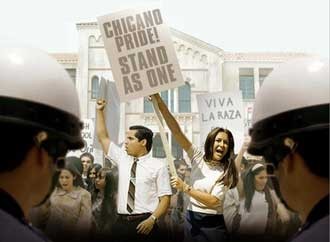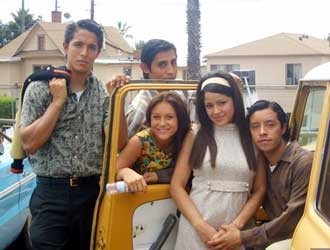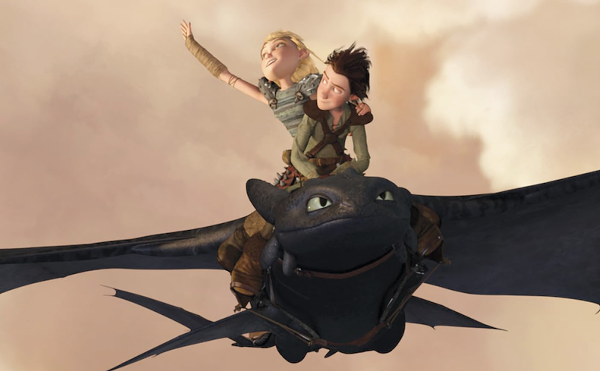Walkout tells the story of the Chicano students who made history in LA
“If no one knows about it,
then it never happened.”
- Sal Castro
Midway through Edward James Olmos’s new film, Walkout, which premieres March 18 on HBO, high-school senior Paula Crisostomo tells her worried mother, “If we don’t stand up now, we never will!” The following day, Paula and more than 10,000 Chicano students walk out of five East L.A. high schools to protest teacher bigotry and a racially biased curriculum in the Los Angeles Unified School District. The 1968 protest becomes yet another flashpoint in the ’60s student movements galvanized by similar curriculum concerns and the anti-war movement.
| A scene from Walkout, Edward James Olmos’s new HBO film about the 1968 East LA student protests. |
The drama begins with body fluids — urine to be exact. Unlike at schools in white neighborhoods, bathrooms in East L.A. high schools were closed during lunch, forcing students to conduct their business in the bushes. When students politely request that the bathrooms be opened during lunch like teachers’ facilities, one white faculty member, fresh from a dump, retorts, “Just hold it like other people do.”
This cynical reply becomes the East LA analogue to “Let them eat cake,” and the shit literally hits the fan.
Olmos’s cinematic portrayal of the non-violent mass student walkout that results is a respectable reprise after 1992’s brilliantly troubling prison and barrio warfare saga American Me. As with most historical films, there are anachronisms and notable absences: Not a single long-haired freak or bearded Chicano appears in the film. Paula’s family home (an immaculate Craftsman bungalow) seems at odds with her father’s income as a custodian. Other barrio settings ape an East Los Angeles version of Spike Lee’s Bensonhurst: plausible but too clean to match the gritty verité.
But like Lee, Olmos is more concerned with film as political discourse than formalist art. The film ostensibly focuses on Paula’s political awakening, but the real star is the evolving grassroots movement. The balance of the film seeks to write Chicanas and Chicanos into the history of American educational reform: Chicano groups such as the Movimiento Estudiantil Chicano de Aztlán, United Mexican American Students, and the Brown Berets finally get a big-screen moment to tell their own story.
| Cast members Diego Torres, Luis Chavez, Alexa Vega, Veronica Diaz, and Efren Ramirez. |
Walkout is a great period piece with some breathtaking camera work and a spirited soundtrack by such ’60s Chicano rockers as Cannibal and the Headhunters and Three Midnighters. Paula is played impressively by Alexa Vega of Spy Kids fame and Laura Harring (Mulholland Drive) is memorable as Paula’s mother. Castro is masterfully portrayed by Michael Peña (Crash); his impassioned campfire reading of Corky Gonzales’s epic poem, “I Am Joaquin,” is both stirring and majestic.
But some Chicana veterans of the movement will be disturbed by an important lacuna in the script. In one scene, two Chicanos claim their place in history by shouting “¡Viva la Raza!” and, comically, “¡Viva la Panza!” Vikki Castro (played by Tonantzin Esparza, daughter of producer Moctezuma Esparza, who was one of the original students) claims her Chicana identity with “Y viva la nalga” as she slaps her own ass. Far too much has been written about sexism in the Chicano Movement to present a prominent student activist (and future LA School Board Member) in such a demeaning scene.
When the students visit the white-majority Pacific Palisades High School, it not only has open bathrooms on weekends, but a library filled with books in all languages, including the Spanish that Chicano students are paddled for speaking. The students conduct a multi-campus survey and distill their complaints into 39 demands, from the banal — serving of Mexican food in the cafeteria — to the structural — such as compulsory bilingual education. They also demand new school buildings comparable to white schools.
| Walkout Dir. Edward James Olmos; writ. Jordan Roberts; feat. Alexa Vega, Efren Ramirez, Marisol Crisostomo, A. Veronica Diaz, Tonantzin Esparza |
The best camera work chronicles the second day of the event, when the LAPD and LA County Sheriff’s Deputies resort to brutality to quell the non-violent protest. Shot with a hand-held camera and slow-motion pans, the police riot scene is reminiscent of Jesus Treviño’s Requiem 29, which similarly features bloodthirsty cops beating women and children in the same neighborhood the following year during a peaceful protest of the Vietnam War.
There is an important twist in the film that I won’t spoil except to say that sometimes Chicanos can be their own worst enemies, especially when it comes to class and gender politics. But the film ends on a positive note, with subtexts proclaiming, “By the fall of 1969, Chicano student enrollment at UCLA increased from 40 to 1,200 students,” and, “As the walkouts spread across the county over the next few years, Chicano college enrollment increased from 2 percent to 25 percent.”
A sobering reality check was offered just one generation later in the 1990s, when Chicano college students, again led by women, staged hunger strikes over the same issues at eight universities — including UCLA! The 1968 walkout may have been “a great day to be Chicano,” as the real Sal Castro later recalls, between tears of joy and pride, but La Raza still has a long way to go to have more than just the occasional day of glory. •
By B.V. Olguín


















